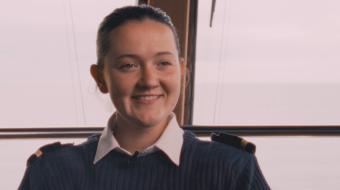The National Oceanography Centre (NOC) provides world leading facilities to the whole UK marine research community through the National Marine Equipment Pool (NMEP), the largest centralised marine scientific equipment pool in Europe.
The NMEP includes two Royal Research ships, the RRS Discovery and the RRS James Cook, which enable the science community to explore the most remote and challenging areas of the ocean.
This exploration wouldn’t be possible without the NOC’s mariners, who dedicate long periods of time at sea, supporting a vast range of ocean science programmes and exciting technology developments. For World Maritime Day, we are sharing a recent video interview with 3rd Officer Rachel Astell, who gives a fascinating insight into her unique role at sea. Read below, or watch the full video interview on YouTube.
What is your role on-board and what does a typical day look like?
My role is 3rd Officer onboard the RRS Discovery. I work on the ship’s bridge 8-12 morning and night time. My other duties involve the maintenance of the ship’s life saving devices and firefighting equipment.
How did you arrive in your current role?
I did my cadetship at the City of Glasgow College. I was originally working on liquid petroleum gas tankers, I then moved on to general cargo ships, before working on the RRS James Cook, the other ship part of the NOC fleet. From there when I qualified, I applied for the 3rd Officer job, and I’ve been here ever since.
What do your family and friends think about the work you do?
When I initially told my friends that I was going to join the merchant navy, they were very surprised. I’d always been a dancer and originally gone to dance college, so it was a bit of a career change for me, but I’ve always had loads of support. My family are very supportive, and they love to hear my stories when I come back from sea.
What is your favourite thing about the work you do?
I love the work that the NOC does, and it’s an incredible position to be in facilitating world-leading science and oceanography. Every single trip is different, which is one of the best things. As 3rd Officer, I get far more experience with ship handling and navigating than you maybe would in other sections of the industry. Day in day out we’re coming off station moving science sites, and the variety of work within the National Marine Equipment Pool is huge. We meet amazing people as well, the scientists are so passionate about what they do, they dedicate so much time of their lives to it, and I love to speak to them about what they’re doing.
What is your favourite memory from your work?
One of my best memories has to be my first trip on the RRS Discovery in January 2020. We were in the Southern oceans, and it was my first time ever experiencing ice. I woke up one morning and saw an iceberg out of my port hole, so I went up to the bridge and we were just surrounded by them. I made myself a cup of tea, and I was walking back to the DP desk and the front door on the bridge was open, I just heard a whale blow out of the side. I looked over and there were humpback whales all along the side of the ship, and over in the distance there were Antarctic Minke whales. That’s the moment when I thought wow, I’ve made some good decisions to be here.
What’s the hardest thing about being at sea?
The hardest thing about being at sea is leaving everybody behind. We spend six months of the year away, and a lot goes on in that time. From when we leave to when we come back it for us it’s like nothing has changed and no time has gone by, but for everyone else, they’ve got birthdays, they’ve got different events that are still going on, so you miss those things. At the same time, we have so much time at home that we can be around for. It is a great way of life, you work when you’re away then you can do anything you want when you’re home.
How do we support equality onboard?
I’m the only female officer in the company at the moment, so it would be great if we could have some more women onboard. We do have women in the catering and galley department and there are an abundance of women in science, which is great to see. I think a way of getting more women into a career at sea would be interviews, like we’re doing now, outreach and just showing women and young girls that this is an option. I never had any family that went to sea, I only heard about the career because I knew somebody that wanted to go and do a cadetship and that made me look into it. Schools definitely need to speak about it as more of an option, because a lot of the guys that are onboard come from a background of sea faring, or fishing so are already in a community where it’s well known. So, just talking about it really.
What are your future dreams and goals?
I would love to be a Captain one day, hopefully of the RRS Discovery.

